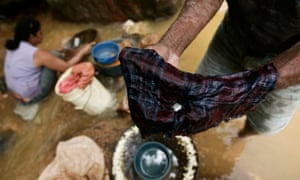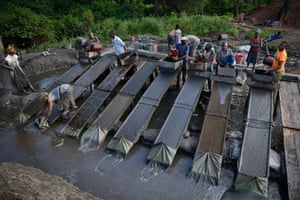https://www.theguardian.com/environment/2017/sep/18/women-of-childbearing-age-around-world-suffering-toxic-levels-of-mercury
Women of childbearing age from around the world have been found to have high levels of mercury, a potent neurotoxin which can seriously harm unborn children.
The new study, the largest to date, covered 25 of the countries with the highest risk and found excessive levels of the toxic metal in women from Alaska to Chile and Indonesia to Kenya. Women in the Pacific islands were the most pervasively contaminated. This results from their reliance on eating fish, which concentrate the mercury pollution found across the world’s oceans and much of which originates from coal burning.
The most extreme levels were found in women from sites in Indonesia where mercury is heavily used in small-scale gold mining and where fish is also commonly eaten. Such gold mining leads to serious mercury pollution and is also a source of harm to women in Kenya, Paraguay and Myanmar.
Industrial pollution is another source of mercury, and the research found this affected women in Nepal, Nigeria and Ukraine.
“Millions of women and children in communities mining gold with mercury are condemned to a future where mercury impairs the health of adults and damages the developing brains of their offspring,” said Yuyun Ismawati, an Indonesian woman from Ipen, the coalition of NGOs that produced the scientific report. “As long as the mercury trade continues, so too will the mercury tragedy.”
Cook Islands resident Imogen Ingram, from the Island Sustainability Alliance, learned that her own mercury levels were two-and-half times higher than the US Environmental Protection Agency’s safety threshold. “It is really alarming to learn that you have, without knowing, passed on mercury to your child,” she said. “Mercury contamination across the Pacific Islands is high because we eat fish. But I do not want to be told not to eat fish. Coal-fired power, one of the primary sources of mercury pollution in the oceans, is the real offender. It is time to phase it out.”
“Mercury contamination is ubiquitous in marine and freshwater systems around the world,” said David Evers, executive director at the Biodiversity Research Institute (BRI), which conducted the scientific tests. “This study underscores the importance of global cooperation to address mercury pollution.”
A global agreement to tackle mercury pollution, the Minamata convention, came into force in August and its first major meeting starts on 24 September in Geneva, Switzerland. It will limit the use of mercury in many products from 2020, but does not ban the international trade in the toxic metal, most of which ends up in small-scale gold mining. Primary production of mercury can continue in some countries until 2032, as the convention stands.
“There are many many loopholes in the trade in mercury,” said Lee Bell, from Ipen, and who led the new research. “It has been an eye-opener that the problem is just as widespread as it is. There are still many things to be resolved [in the convention] and it is not moving fast enough.” Bell urges all countries to follow the US and EU in introducing unilateral bans on exporting mercury.
The study focused on women aged 18-44, as they are most at risk because developing foetuses are so sensitive to mercury, he said. “Women have to be very careful, in any country, of what type of fish and how much they eat,” he said. The UK’s Food Standards Agency advises pregnant women, those trying to conceive and children not to eat any shark, swordfish or marlin, as these top predators have the highest levels of mercury. The FSA also advises these groups to limit their tuna consumption.
The Ipen work expanded a smaller study it conducted with the UN Environment Programme to test hair samples from more than 1,000 women from 36 places in 25 countries. In the Pacific Islands, which are far from all industrial sources of mercury pollution, 86% of the women had levels above the 1ppm safety limit, with most over three times that.
Above 1ppm of mercury, brain, heart and kidney damage can occur. The most recent scientific assessment indicates that lifelong brain damage to foetuses can begin at the lower level of 0.58ppm and in many of the sites studied virtually all the women exceeded this level.
Overall, in the places affected by small-scale gold mining, more than half the women exceeded the 1ppm limit, with results of up to nine times the limit found in Indonesia. In industrial areas, 20% of the women had high levels of mercury. In Alaska, where seals are an important food for the indigenous women tested, a third had high levels.
More than 370 sites polluted with mercury around the world have been identified by Pure Earth, a pollution clean-up group. Its global policy director, Andrew McCartor, said: ”Our program clearly demonstrates that mercury contamination is widespread, and the new study from Ipen and BRI shows that it is taking a significant toll on our most vulnerable populations.”
McCartor said, as well as stopping the release of mercury, more work is needed to clean up toxic sites: “Many of these sites are essentially orphaned with no plans or funding for cleanup, poisoning generation after generation. The remediation of contaminated sites is crucial, but often ignored and underfunded.”
Since you’re here …
… we have a small favour to ask. More people are reading the Guardian than ever but advertising revenues across the media are falling fast. And unlike many news organisations, we haven’t put up a paywall – we want to keep our journalism as open as we can. So you can see why we need to ask for your help. The Guardian’s independent, investigative journalism takes a lot of time, money and hard work to produce. But we do it because we believe our perspective matters – because it might well be your perspective, too.
I appreciate there not being a paywall: it is more democratic for the media to be available for all and not a commodity to be purchased by a few. I’m happy to make a contribution so others with less means still have access to information.Thomasine F-R.
If everyone who reads our reporting, who likes it, helps to support it, our future would be much more secure.


沒有留言:
張貼留言